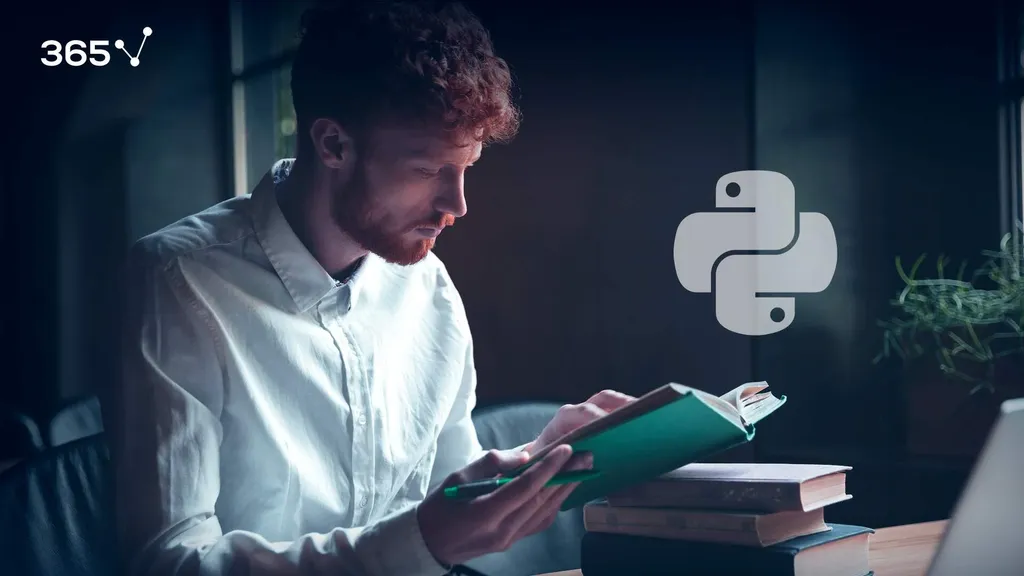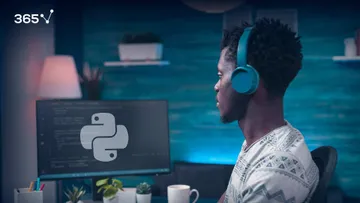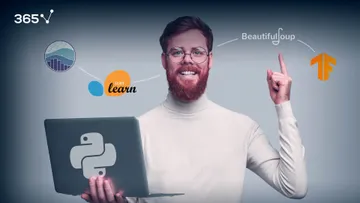
Before you embark on a data science career path, you first need to know at least one programming language as it is an essential skill to break into the industry. So, why learn Python? For starters, it has risen in popularity in recent years and continues to be highly in demand – currently holding the number 1 spot in the TIOBE Index. And with an accessible syntax and multitude of libraries, it is the top choice for data scientists across the board. Further, employers are increasingly seeking Python experts, as evidenced by Coding Nomads’ deep dive into the requirements for data science jobs.
While there is countless online learning material at your disposal, sometimes cooking by the book is the way to go. For this reason, we’ve compiled a list of the 10 best Python books in varying degrees of difficulty, from titles for complete beginners to more advanced programmers who are looking to take their skills to the next level:
Python Books for Beginners
As with all new challenges, you won’t necessarily have the knowledge to tackle them head-on. But that’s not a bad thing. We all have to start somewhere, right? With these beginner-friendly books, you’ll have more than enough to get you off the ground.
Python Crash Course
Python Crash Course: A Hands-on, Project-Based Introduction to Programming by Eric Matthes is your one-stop shop for all your beginner Python needs. Separated into 2 parts, the book teaches you the basic concepts behind the programming like the if statement, lists, dictionaries, among many others. In the second half, you’ll have the chance to implement your newfound knowledge with practical projects such as:
- An arcade-style game
- Data visualization exercises
- A web application
Written in a straightforward, well-organized style, Python Crash Course breaks down the information into easily digestible chunks. And to supplement that, the author has supplied some free and easily downloadable online resources.
Learning Python
Another great title for beginners is Learning Python: A Powerful Object-Oriented Programming by Mark Lutz. It offers in-depth context to Python’s fundamentals, introducing you to everything you need to know and actually explaining the meaning behind each feature.
The structure is divided into 9 parts, each focusing on a different area, e.g., data types, syntax, modules, decorators, etc. To make things even easier, each topic has its own chapter. In fact, the book is so pack-full of information that it makes for an excellent reference guide as well.
The current (fifth) edition supports both Python 2 and 3.
Learn Python the Hard Way
Don’t let the title fool you –Zed Shaw’s Learn Python the Hard Way is as its subtitle states: “a very simple introduction to the terrifyingly beautiful world of computers and code”. Inside this book, you will find 52 carefully crafted exercises that aim to develop your coding and problem-solving skills, as well as teach you about:
- Data structures
- Object-oriented programming
- Development basics
One downside is that this edition is all about the outdated Python 2. Fortunately, there’s an update – Learn Python 3 the Hard Way.
Automate the Boring Stuff with Python
Have you ever had to work with big spreadsheets or something equally tedious? It can get quite, well, boring. Many of us have undoubtedly sat there, wishing the task could complete itself. Automate the Boring Stuff with Python: Practical Programming for Beginners by Al Sweigart shows us how to do just that.
Even if you have no prior experience, this beloved bestseller will take you through the process step by step, turning you from an inexperienced Python newbie into a budding programmer. By the time you’ve finished, you’ll know how to write simple automated programs for web scraping, sending emails, PDF and Word file management, etc. – saving yourself some time while you’re at it.
Python for Everybody
Python for Everybody: Exploring Data in Python 3 by Charles R. Severance is a comprehensive Python guide for students who want to learn programming and experiment with big data. Much like picking up a dictionary, you’ll study the easy-to-read Python syntax while also:
- Importing information
- Labeling data
- Using variables and functions
The author has also included handy charts and pieces of code so you can follow along every step of the way. But that’s not all – you’ll be able to find supplementary free resources on his website, PY4E.
Bonus: A Byte of Python
As a student or even a working professional in a field other than data science or programming, the prices of these books can make quite a dent in your wallet. Thus, we wanted to introduce you to a great alternative – the open-source book by C. H. Swaroop, A Byte of Python.
This title is perfect for beginners as it’ll give you an overview of Python and its history, then move on to introduce the basic principles without overwhelming you. Of course, you still get in-depth explanations and examples and, at the end, the author presents you with a problem to solve on your own, using your newfound knowledge.
What is even more special about this book is that the Python community has translated it into 26 other languages, making it accessible for an even wider audience.
Advanced Python Books
Already have some knowledge of Python? Then, these books will help you sharpen the tools you have and gain a competitive advantage amongst your peers.
Keep in mind, however, that they are not light reads – you need some previous experience to understand and successfully navigate through the contents of these books.
Python Tricks
With Python Tricks: A Buffet of Awesome Python Features, author Dan Bader shares surprising tricks and best practices in a few concise lines, supplying extremely clear descriptions of why code behaves as it does.
It’s important to note that this book is geared towards intermediate learners rather than advanced programmers; it does not go into the full depths of the language. However, it will teach you how to:
- Clean up your code
- Become more efficient
- Catch up to the latest versions of Python
With chapters like Covering Your A** with Assertions or A Shocking Truth about String Formatting, you get a roadmap into the lesser-known parts of Python, written in an uncomplicated, friendly tone.
Python for Data Analysis
Perhaps you’re familiar with the name Wes McKinney, the creator of the pandas library, or perhaps you’re just interested in data science. In both cases, Wes’s book, Python for Data Analysis: Data Wrangling with Pandas, NumPy, and IPython, is perfect for you.
In this hands-on guide, you will get thorough instructions on how to:
- Work with the essential Python libraries
- Perform data wrangling
- Implement linear algebra and time series data into your analysis
- Solve real-world problems through practical examples
Drawing from his years of experience, Wes McKinney aims to teach you how to take advantage of all Python functionalities for your data science exploration. Moreover, there is a third, updated edition coming out soon, but you can get early access to the raw, unedited text on the author’s website.
Learn More Python the Hard Way
This title sounds familiar, doesn’t it? Learn More Python 3 the Hard Way is a follow-up to Zed Shaw’s beginner-friendly book we mentioned previously. Similar to its predecessor, it features another 52 exercises, designed to test and build upon your core Python knowledge.
The book is divided into 5 sections:
- Working with commands
- Organizing data
- Applying algorithms
- Processing text
- Implementing simple networking protocols
Don’t expect it to go easy on you – from the first page, you’re plunged into a series of challenging exercises that will ultimately help you achieve a higher level of proficiency.
Effective Python
Effective Python: 90 Specific Ways to Write Better Python by Brett Slatkin is a fountain of programming knowledge. Covering topics like metaclasses and concurrency, as well as essentials like robustness, testing, and collaboration, the book gathers everything you need to advance in your specialization, all under one roof.
It can be difficult to find resources that are solely focused on the language we’re currently learning. Effective Python is one such resource that concentrates entirely on what makes Python so… Pythonic. Instead of teaching you the basis of syntax, the author directly goes into the nitty-gritty to explain the language’s specific “quicks” so that you extract the most gain.
Fluent Python
Finally, we’re going to introduce you to one of the most popular books to learn Python for advanced specialization – Fluent Python: Clear, Concise, and Effective Programming by Luciano Ramalho. At almost 800 pages, this beast concerns itself with all the often-overlooked features that Python has to offer, as well as introducing you to concepts such as metaprogramming. It will draw you out of your programming conventions and allow you to consider a new way of coding that is much cleaner and more efficient.
Having said that, it is not an easy read and if you don’t already have a certain level of proficiency, then you might find it difficult to follow along with the jargon and concepts covered. Essentially, Fluent Python aims for exactly what it says on the tin – to make you truly fluent.
You can soon expect a second edition that builds upon everything in the original while leveraging all the best practices in Python 3.
Best Python Books: Next Steps
Now that you have all the resources available, it’s time to get down to business. Learning any language is a journey that never actually stops – the same applies to Python as it constantly evolves over time. Once you’re confident in your abilities, however, you’re ready to start on your own projects (browse our recommendations for free resources if you’re stuck), then apply for Python jobs.
And if books aren’t your thing, then feel free to check out our Introduction to Python course, which lays the foundations of the programming language. After, if you’re feeling up for the challenge, you can try our intensive Python Programmer Bootcamp course that will truly take you to the next level.
Are you ready to take the next step towards data science?
The 365 Data Science Program offers self-paced courses led by renowned industry experts. Starting from the very basics all the way to advanced specialization, you will learn by doing with a myriad of practical exercises and real-world business cases. If you want to see how the training works, start with a selection of free lessons by signing up below.







